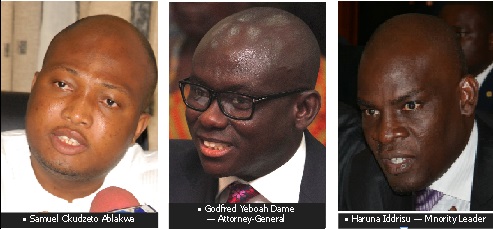
A-G, 3 MPs cross swords in Supreme Court over E-Levy
The electronic transfer levy (E-Levy) is in force, but the legal battle surrounding its legality has just begun, as the Supreme Court will, today, hear an injunction application seeking to halt the implementation of the levy.
At the centre of this legal battle are three National Democratic Congress (NDC) Members of Parliament, led by the Minority Leader, Haruna Iddrisu, who are of the view that the passage of the E-Levy was unconstitutional, and the Attorney-General (A-G), Godfred Yeboah Dame, who says that its passage was constitutional.
Advertisement
The three NDC MPs, who argue that there were 136 or “137 purported” MPs present during the passage of the E-Levy, instead of the required quorum of 138, want the apex court to put the E-Levy on hold until the determination of their suit challenging its constitutionality.
Messrs Iddrisu, Mahama Ayariga and Samuel Okudzeto Ablakwa aver that millions of people will suffer irreparable harm if the E-Levy Act is not put on hold and the court determines that its passage was unconstitutional.
According to them, the GRA would not be able to reimburse the millions who would have already paid the E-Levy, while the 1992 Constitution, the supreme law of the land, would have been undermined.
A-G’s position
However, Mr Dame, in his affidavit in opposition, has described the injunction application as “incompetent”, one that raises no cause of action and full of factual inaccuracies.
According to him, records from Parliament showed that 266 MPs were in Parliament when the second reading of the bill, which was the question to approve the E-Levy, was put.
Also, he argued that per the disqualification of the NDC MP for Assin North, James Gyakye Quayson, by the Cape Coast High Court, there were currently 274 elected MPs and, therefore, the constitutionally required quorum for decision-making in Parliament was now 137, not 138.
It is the case of the A-G that records from Parliament showed that during the passage of the E-Levy on March 29, this year, 137 MPs from the
Majority were present, meeting the constitutionally required quorum for decision-making.
“For the avoidance of doubt, apart from Sarah Adwoa Safo, all the 137 members of the Majority were present in the Chamber, with the Minority rather missing as many as eight members,” the A-G submitted.
He further submitted that the three plaintiffs were not even sure of the number of MPs present during the passage of the E-Levy, which he argued was fatal to their case and meant they had no cause of action.
“The factual uncertainty in the plaintiff’s case, as displayed in their allegation that ‘there were only 136 or the ‘purported 137’ members from the Majority Caucus’ is fatal to the action and demonstrates that plaintiffs have no cause of action.
“That the plaintiffs have failed to demonstrate any facts, or the commission of any act or an omission on the part of Parliament in the constitutionally prescribed procedure for the passage of the Electronic Transfer Levy Act, 2022 (Act 1075),” the A-G added.
Substantive case
The three MPs, in their substantive suit, want the apex court to declare the passage of the E-Levy as unconstitutional and, therefore null and void.
It is their case that Parliament did not have the right quorum to pass the E-levy, as stipulated under Article 104 (1) of the 1992 Constitution, which had recently been interpreted by the Supreme Court.
According to them, as of the time the second reading of the passage of the E-Levy was done, there were only 136 MPs present in Parliament, instead of the required 138.
Writer’s email: [email protected]



